JICA and JAXA: Co-Creation Expands the Possibilities of “Space Technology’s Contribution to Development Cooperation”
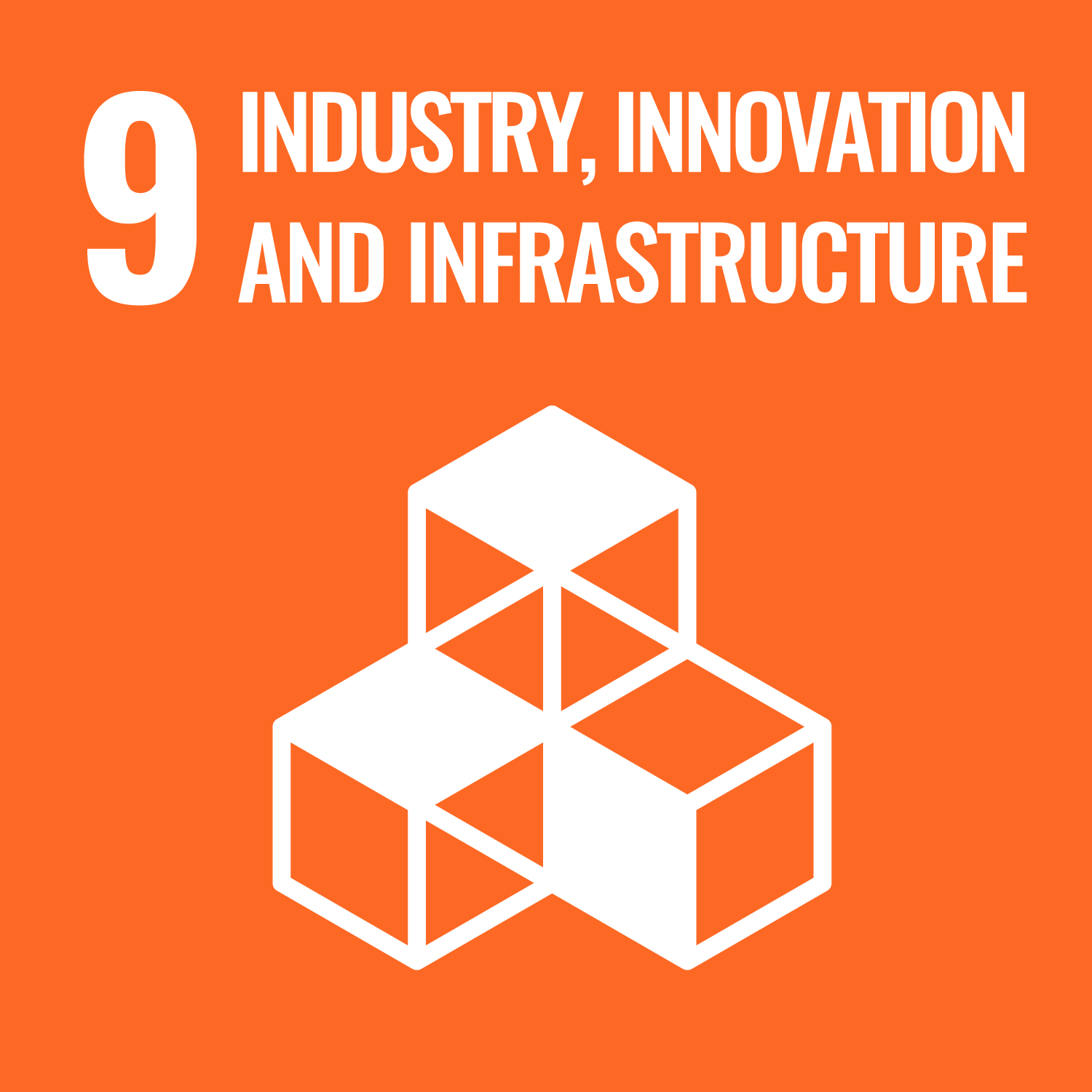

2024.03.06
April 2024 marks the 10th anniversary of a partnership agreement signed by JICA and JAXA (Japan Aerospace Exploration Agency). JAXA’s Nakamura Takehiro and JICA’s Takatoi Shunsuke discuss what this partnership has yielded in development cooperation and space technology, and what they see for the future.
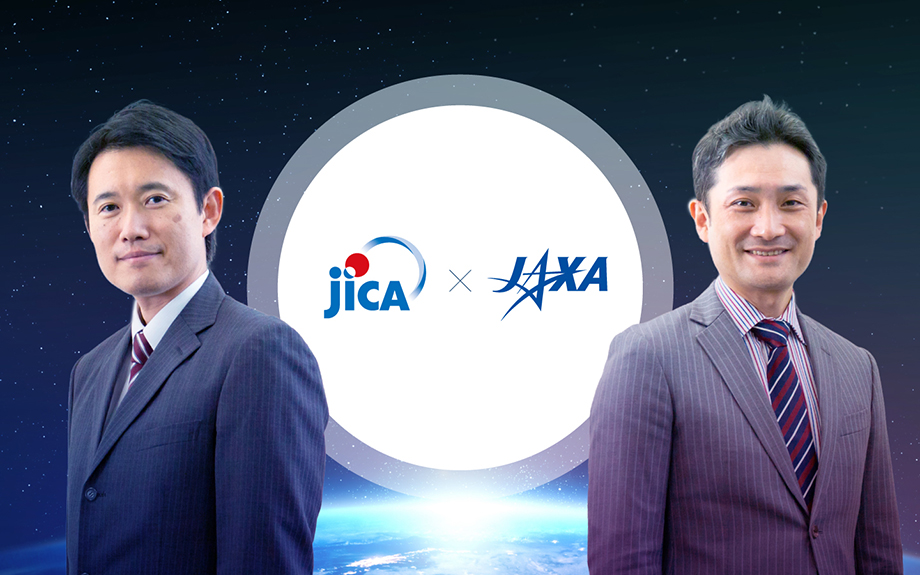
Takatoi Shunsuke, Senior Director, STI and DX Office, Governance and Peacebuilding Department, JICA (left), and Nakamura Takehiro, Director of the Bangkok Office, JAXA.
TAKATOI: Of the various forms of collaboration with JAXA over the past 10 years, the JICA-JAXA Forest Early Warning System in the Tropics (JJ-FAST), which has helped to stop illegal logging, stands out the most. We were able to develop and operate a system for early detection of deforestation in the tropics using data from the DAICHI-2 satellite, which is unaffected by weather conditions, such as cloud cover.
NAKAMURA: All of us at JAXA are proud of the fact that we were able to detect illegal logging in 78 countries. It is important to develop and perfect technology, but it is also a great pleasure for us as an R&D institution to see our technology being used for the benefit of the social economy and the global environment. The appreciation shown by the governments of Brazil and other countries has also been a great motivator.
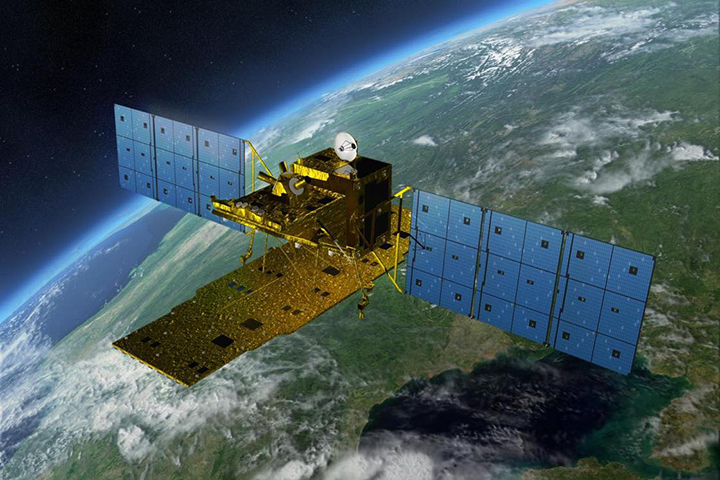
Computer-generated image of JAXA's Advanced Land Observing Satellite-2 “DAICHI-2” (ALOS-2). Image courtesy of JAXA
TAKATOI: While the operation of JJ-FAST was underway in Brazil, we were also able to improve the Brazilian government’s forest management capacity by establishing a prediction system for illegal deforestation in the Amazon using AI technology. This represents a typical example of JICA’s cooperation. This series of projects, in which satellite data was shared among 78 developing countries to curb illegal logging, also provided an opportunity for JICA to learn how to cooperate using satellite data, space technology, and open innovation.
As the number of developing countries establishing new space agencies is increasing, collaboration with JAXA is indispensable to the development of human resources in the field of space-related technology. The JICA-JAXA Network for Utilization of Space Technology (JJ-NeST), launched in 2019, provides learning opportunities for practitioner and researchers, mainly from Southeast Asia, who will be responsible for the future development and use of space technology. The network supports their participation in study abroad programs at graduate schools in Japan, and gives them the chance to learn cutting-edge technologies from JAXA researchers and representatives from the private sector.
NAKAMURA: JJ-FAST is a direct effort to use technology to provide solutions to current and emerging social issues and protect the environment. On the other hand, human resource development such as JJ-NeST is an initiative targeting the future, looking ahead some 10 or 15 years from now. I look forward to working with the JJ-NeST graduates one day, as they make the most of their studies and the contacts they have cultivated in Japan.
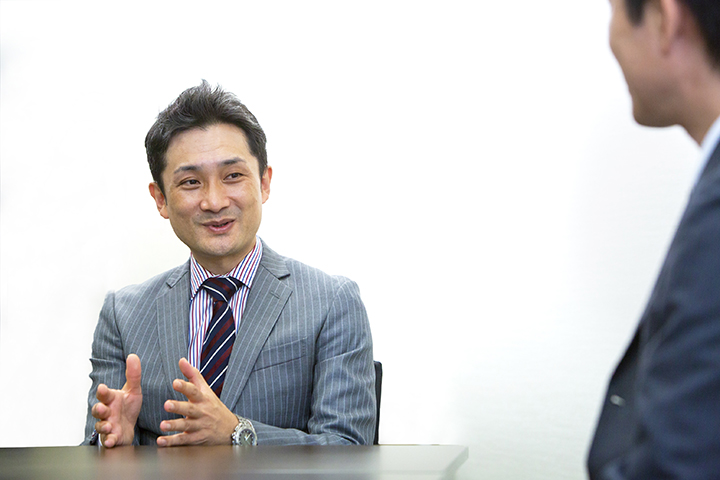
Nakamura Takehiro, Director of the Bangkok Office, JAXA.
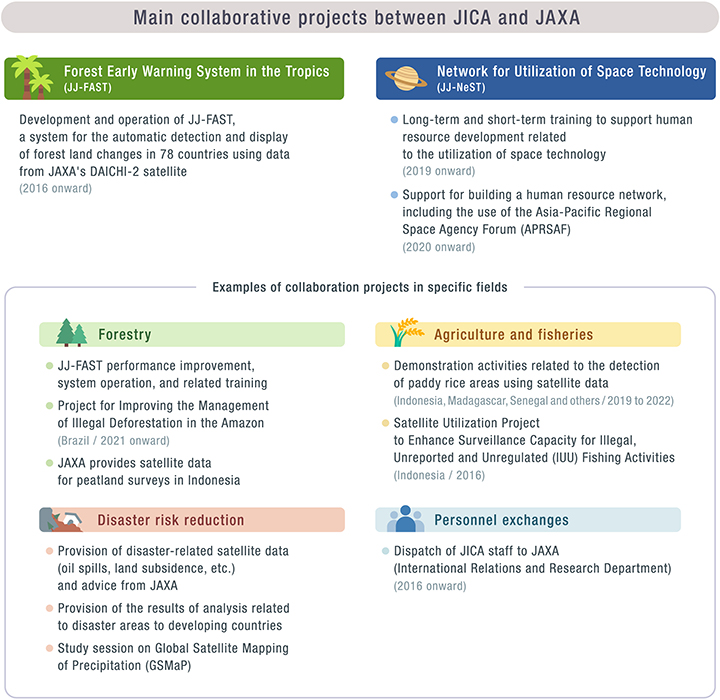
TAKATOI: In the field of disaster management, JICA also collaborates with Sentinel Asia,*1 which is a three-way partnership among the space agencies that provide satellite data, the research institutes that analyze the data, and the government agencies that utilize the data, to assess damage from floods, landslides, earthquakes, volcanic eruptions, and other disasters. In recent years, many developing countries have expressed their interest in utilizing satellite data to solve various social issues. After widespread flooding in the African country of Rwanda in May 2023, for example, the Rwanda Space Agency contacted the local JICA office to see if satellite data could be used in the recovery and reconstruction efforts.
NAKAMURA: I'm currently stationed in Bangkok. In Southeast Asia, where rice cultivation is widespread, satellite data is already being used in the agricultural sector. We are working on an initiative involving the R&D of applications that monitor weather conditions affecting agriculture by combining satellite earth observation data and AI to realize timely monitoring of rice crop conditions and yield forecasts to increase yields more efficiently. In Thailand and other countries in the region, we are also working to promote so-called smart agriculture whereby farm machinery is automated through the installation of “electronic reference points” on the ground to obtain highly accurate location information from satellites.

Screenshot of INAHOR, an application developed by JAXA that combines satellite data from DAICHI-2 and AI to estimate the acreage and yield of paddy rice.
SAFE Rice Monitoring project
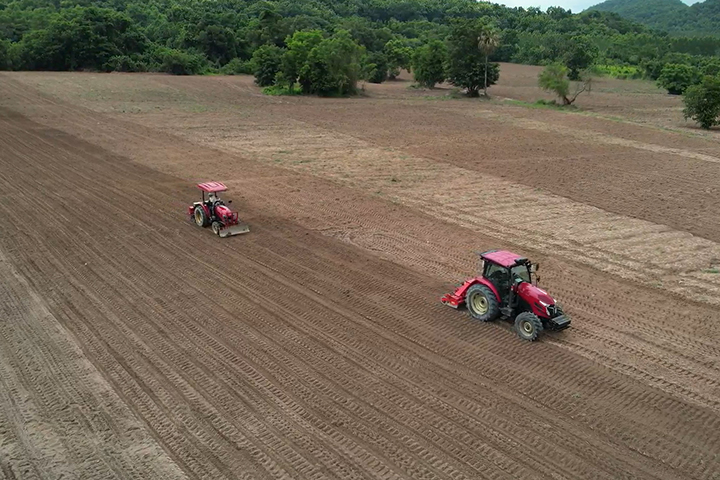
JICA is implementing the Project for Capacity Development and Promotion of Utilization of National CORS* Data Center in Thailand to promote the introduction of autonomous agricultural machinery into agricultural work. Agri DEMO DAY, one of the project’s events to promote the spread of smart agriculture, was held in June 2023.
*CORS (or Continuously Operating Reference Stations) are electronic reference points that are used for highly accurate positioning of machinery.
TAKATOI: The potential for satellite data utilization is steadily expanding. In the health sector, satellite data can be used to understand how infectious diseases spread. I also think that satellite data can be used to improve people's incomes and lifestyles. Our office is working to promote the use of space technology and satellite data in all of JICA's initiatives.
NAKAMURA: One of our recent initiatives is the Project to Reduce Greenhouse Gas Emissions from Paddy Fields. A surprisingly large amount of methane gas is emitted from paddy fields by microorganisms. We are now conducting a demonstration project to control water levels and reduce methane gas emissions while maintaining yields by measuring the water level of rice paddies from the DAICHI-2 satellite, and combining this data with IoT sensors on the ground and emission calculation methods. If this succeeds, the amount of greenhouse gas emission reductions could be converted into emission credits, which farmers could trade to improve their incomes. This could lead to the elimination of poverty, one of the SDGs. The project started in the Philippines last summer and is planned to be implemented in Thailand, Vietnam, and other countries as well. We look forward to working with JICA, which is well versed in the local conditions and has a strong network in the region.
It’s also important to note that JAXA is not carrying out this initiative alone. In the Philippines, for example, private companies, JAXA, JETRO (Japan External Trade Organization), local universities, local governments, and farmers are all working together to implement the project. The goal is to advance innovation through global partnerships among diverse stakeholders. We expect that in the future, the project will be commercialized by the private sector, solving social issues through sustainable activities using the power of the economy.
TAKATOI: I’d like to be a part of that. The Development Cooperation Charter, revised in June 2023, states that "Co-creation" and "International Brain Circulation*2" are key. Of course, there is a need for traditional intergovernmental efforts. However, in order to utilize space technology and satellite data to solve global issues and various issues in developing countries in the future, it is important for JICA and JAXA to serve as hubs and collaborate with various players, including startups, universities, and research institutions.
To that end, I’d like to, for example, launch JJ-NeST as a platform for human resource development, and utilize it to promote initiatives to connect developing countries with local governments, universities, and local companies in Japan that are promoting space-industry development.
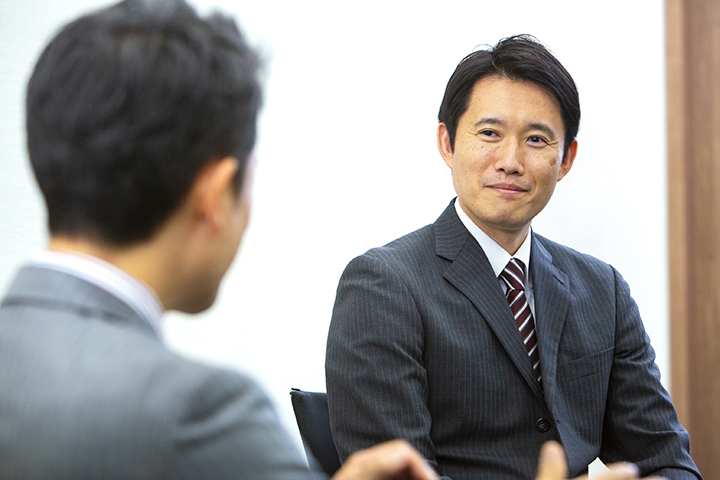
Takatoi Shunsuke, Senior Director, STI and DX Office, Governance and Peacebuilding Department, JICA.
NAKAMURA: In 2022, industry, academia, and government representatives, led by JAXA, launched CONSEO (Consortium for Satellite Earth Observation) to co-create the future through the power of satellite earth observation. With its 200 plus participating member organizations, including JICA, private companies, and local governments, CONSEO is beginning to engage in collaborations to further contribute to the social economy through satellite earth observation. Since I’m in charge of global development within this consortium, I’d like to team up with JICA so that both institutions can become central hubs for this community and be involved in various types of co-creation.
TAKATOI: I believe that one of the factors behind the trend among developing countries of establishing space agencies and having their own satellites is their awareness of issues related to the international situation and the security environment. It is extremely important that emerging space countries see Japan as a reliable partner, and we would like to respond to their needs.
NAKAMURA: I think each country has a desire to resolve social issues and achieve economic growth. JAXA can provide technology to address these challenges. But JAXA does not have information on local social issues or potential partners. That's why collaboration with JICA is so important.
In the future, the goal is not merely to see JICA and JAXA in action, but to see us acting as central players within communities such as CONSEO, serving as a bridge between diverse stakeholders and the socio-economy, and making space activities an integral part of the social economy. Sustainable space activities will lead to sustainable solutions to social issues. Let's create an environment where various partners can tackle global issues from both global and space perspectives.
TAKATOI: In September 2023, 45 JICA staff members underwent training at JAXA's Tsukuba Space Center. The training involved learning how to utilize satellites and space technology to solve problems in the various areas of development cooperation that JICA is working on. We believe that space technologies and solution services provided by private companies can be further refined in the actual development environment. It is also necessary to change the mindset of JICA staff members, who act as intermediaries. I’d like to see Japan's space startups that have worked together with JICA and JAXA solving problems in developing countries, and growing into large companies like SpaceX.
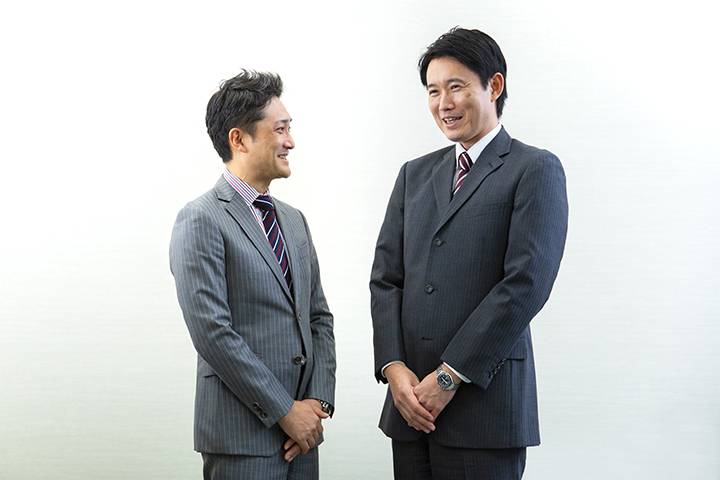
scroll